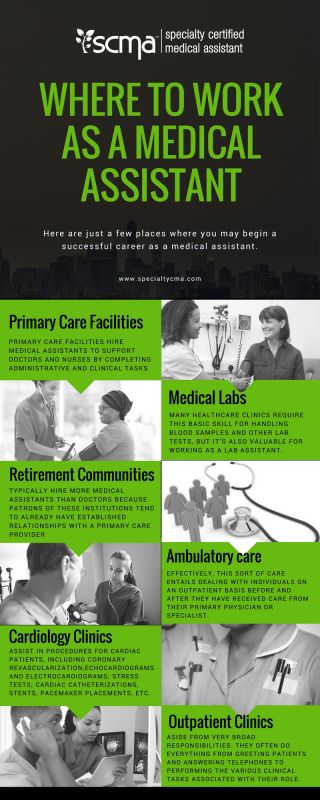The U.S. Bureau of Labor Statistics (BLS) says that medical assistants held about 591,300 jobs in 2014. Most of these assistants work in physicians' offices, hospitals, outpatient clinics, and other healthcare facilities.
Primary Care Facilities
When one says "primary care" this basically includes health promotion, disease prevention, health maintenance, counseling, patient education, diagnosis and treatment of acute and chronic illnesses in a variety of health care settings (e.g., office, inpatient, critical care, long-term care, home care, day care, etc.).
Primary care facilities hire medical assistants to support doctors and nurses by completing administrative and clinical tasks—and those tasks abound in these workplaces.
Medical Labs
A medical laboratory or clinical laboratory is a laboratory where tests are usually done on clinical specimens in order to obtain information about the health of a patient as pertaining to the diagnosis, treatment, and prevention of disease.
Lab tests are examinations performed on blood, body fluids, tissues, and other substances in order to determine what is normal or what is abnormal for a patient.
It is not one of those first thought of as workplaces by medical assistants themselves but many labs unaffiliated with primary healthcare do employ medical assistants.
Retirement Communities
A retirement community is a housing complex designed for older adults who are generally able to care for themselves; however, assistance from home care agencies is allowed in some communities, and activities and socialization opportunities are often provided.
A medical assistant may find many career opportunities in nursing homes, facilities that often resemble hospitals in the care they provide. Retirement communities are the types of places where older (but not necessarily infirm) people live after finishing their careers.
Ambulatory Care Facility
Ambulatory care, sometimes called outpatient care, describes medical care or treatment that does not require an overnight stay in a hospital or medical facility. Outpatient care may be administered in a medical office or a hospital, but most commonly, it is provided in a medical office or outpatient surgery center.
Medical care provided in these facilities including diagnosis, observation, consultation, treatment, intervention, and rehabilitation services. This care can include advanced medical technology and procedures even when provided outside of hospitals.
Cardiology Clinics
Cardiologists diagnose and treat congenital heart defects, arrhythmias, coronary artery disease, heart failure, valvular heart disease and other heart conditions. From minor testing during office visits to major surgeries scheduled at the hospital, cardiologists offer a broad range of heart-related services and care.
Medical assistants are vital to efficient and successful patient care. Working alongside doctors, nurses and other staff, these professionals help with patient procedures, take vital signs and blood pressure. Medical assistants in the cardiology field perform these basic functions in addition to more specialized duties.
Outpatient Clinics
Outpatient services are medical procedures or tests that can be done in a medical center without an overnight stay. Many procedures and tests can be done in a few hours. Outpatient services include: Wellness and prevention, such as counseling and weight-loss programs. Diagnosis, such as lab tests and MRI scans.

 844.885.1476
844.885.1476



